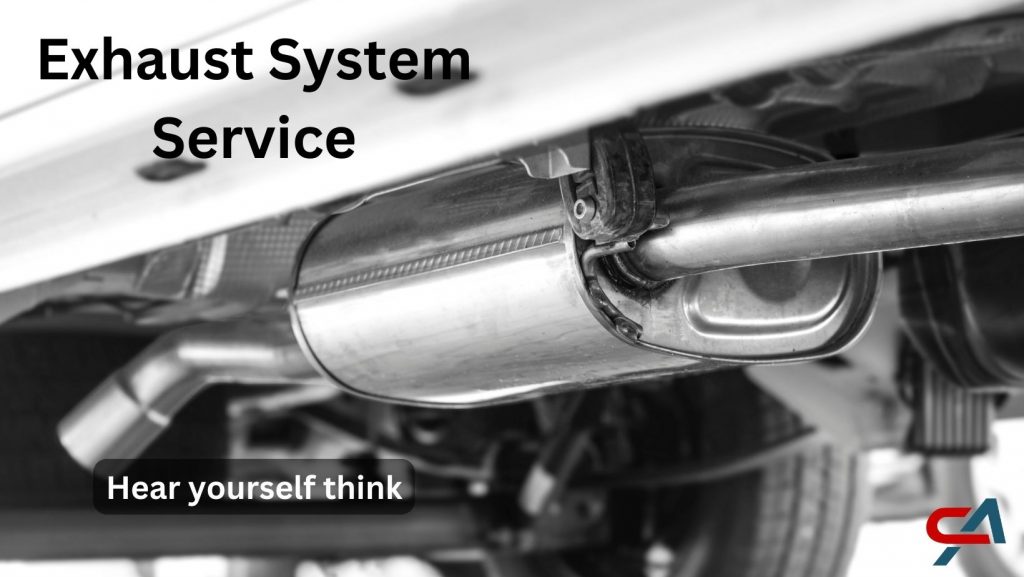Clearing the Air: A Comprehensive Guide to Exhaust System Service
Your vehicle’s exhaust system quietly performs a crucial role in maintaining engine efficiency and reducing environmental impact. Over time, wear and tear can affect its performance, leading to decreased fuel efficiency and increased emissions. In this detailed guide, we’ll explore what exhaust system service entails, why it matters, and how it contributes to your vehicle’s overall health and environmental responsibility.
Exhaust System Service Unveiled: Nurturing Engine Performance and Environmental Responsibility
Exhaust system service is a comprehensive maintenance process that involves inspecting, repairing, and replacing components within the exhaust system. The primary goal is to ensure proper emission control, maintain engine efficiency, and prevent potential hazards associated with a malfunctioning exhaust system.
Components Addressed in Exhaust System Service: The Symphony of Emission Control
Exhaust Manifold:
The exhaust manifold collects exhaust gases from the engine cylinders and directs them into the rest of the exhaust system. It is inspected for leaks and cracks.
Catalytic Converter:
The catalytic converter is a vital component that converts harmful pollutants in exhaust gases into less toxic substances. It is inspected for efficiency and potential clogging.
Muffler:
The Muffler dampens the noise of exhaust gases and directs them out of the vehicle. Mufflers are checked for leaks, corrosion, and proper functioning.
Exhaust Pipes:
Exhaust pipes connect the various components of the exhaust system. They are inspected for leaks, rust, and structural integrity.
Oxygen Sensors:
Oxygen sensors monitor the oxygen levels in the exhaust gases, providing the engine control unit feedback for optimal fuel-air mixture. They are inspected for proper functioning.
Resonator:
In some exhaust systems, a resonator is used to reduce noise further. It is inspected for leaks and structural integrity.
The Need for Exhaust System Service: Addressing Performance and Environmental Concerns
Reduced Engine Efficiency:
A malfunctioning exhaust system can lead to backpressure, restricting the efficient expulsion of exhaust gases and reducing engine efficiency.
Increased Emissions:
A compromised catalytic converter or other exhaust components can result in higher emissions, contributing to environmental pollution and potentially causing a vehicle to fail emissions tests.
Excessive Noise:
Leaks or damage to mufflers and resonators can increase noise levels, leading to a louder and less comfortable driving experience.
Safety Concerns:
Exhaust leaks can introduce harmful gases, such as carbon monoxide, into the vehicle cabin. Addressing leaks is essential for driver and passenger safety.
Failed Emissions Tests:
A malfunctioning exhaust system can cause a vehicle to fail emissions tests, leading to regulatory issues and potentially restricting road legality.
Signs Your Vehicle Needs Exhaust System Service: Listening to the Warning Sounds
Increased Exhaust Noise:
Suppose you notice a sudden increase in exhaust noise. In that case, it may indicate a leak or damage in the exhaust system, particularly in the Muffler or Resonator.
Unusual Odors:
Strange odors, such as a sulfur-like smell, can be indicative of a malfunctioning catalytic converter or other exhaust component.
Reduced Fuel Efficiency:
A decrease in fuel efficiency may signal a problem with the exhaust system, leading to increased backpressure and engine strain.
Dashboard Warning Lights:
Illuminating the check engine light or other relevant warning lights on the dashboard may indicate issues with the exhaust system.
Hissing or Popping Sounds:
Unusual hissing or popping sounds during acceleration or deceleration may point to leaks or other problems in the exhaust system.
Service Intervals: Timing the Maintenance of Emission Control
The frequency of exhaust system service can vary based on factors such as driving conditions, vehicle age, and manufacturer recommendations. It is advisable to consult your vehicle’s owner’s manual for specific guidelines on service intervals.
Benefits of Exhaust System Service: Breathing Easy with Environmental Responsibility
Optimal Emission Control:
Regular exhaust system service ensures that emission control components like catalytic converters function optimally, reducing harmful pollutants released into the environment.
Maintained Engine Efficiency:
A properly functioning exhaust system facilitates the efficient expulsion of exhaust gases, contributing to optimal engine performance and fuel efficiency.
Reduced Noise Levels:
Addressing issues with mufflers and resonators results in a quieter and more comfortable driving experience.
Improved Safety:
Timely exhaust system service helps prevent harmful gases, such as carbon monoxide, from entering the vehicle cabin, ensuring a safe driving environment.
Compliance with Emissions Regulations:
Regular service ensures that your vehicle complies with emissions regulations, preventing legal issues and facilitating a smooth inspection process.
Manufacturer Recommendations: Adhering to Service Intervals for Optimal Performance
To ensure your vehicle’s ongoing performance and environmental responsibility, it is essential to adhere to the exhaust system service intervals recommended by the manufacturer. Following these guidelines helps maintain optimal emission control and prolongs the lifespan of exhaust system components.
The exhaust system may work silently, but its role in maintaining engine efficiency, reducing emissions, and ensuring a safe driving experience is paramount. Exhaust system service is a proactive approach to addressing performance issues, environmental concerns, and potential safety hazards. By understanding the components discussed in exhaust system service, recognizing signs that your vehicle may need it, and adhering to manufacturer recommendations for service intervals, you can contribute to a cleaner environment and enjoy a smoother, more responsible driving experience

